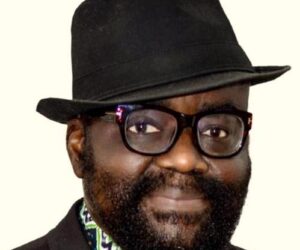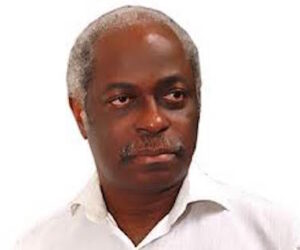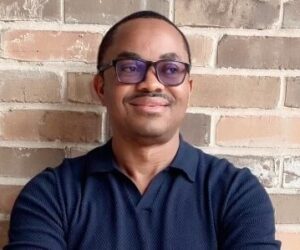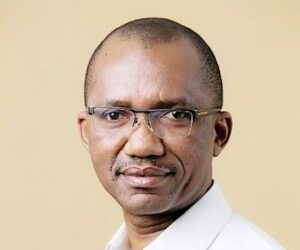Ndi Enugu, I bring you very warm greetings, a day we usher in a new epoch in the history of our dear state, and in the life of our children. It is a day of celebration as much as for introspection.
Africa, today, is the youngest continent in the world. More than 60% of our people are under the age of 25. By 2050, our population will reach 2.5 billion, and one in every three young people on earth will be an African. This is a stark reminder that our future will be built by young hands.
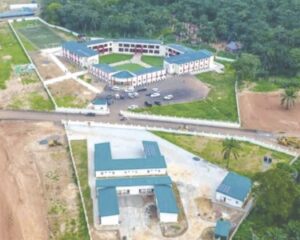
This is not just a statistic; it is a summons. It means that the destiny of African nations rests on what we nurture in the minds and hearts of our children. If we raise them well and leave them opportunity, when they inherit tomorrow, when they own it, they will shape it and defend it. If we fail them, no amount of slogans will save us.
‘Tomorrow Is Here’ is not simply a catchphrase for Enugu; it is a covenant with that future. It is the recognition that the sovereignty of our state, of Nigeria, and indeed of Africa, will be determined by the strength of our young people – their ability to think critically, to innovate and to act with integrity.
Our sovereignty begins in the classroom. It begins with how we choose to welcome the child into the world. And this takes time, care – and investment.
I was not born into comfort. I grew up in the slums of Port Harcourt, where every day was a struggle and nothing was guaranteed. But one thing was always clear to me: if I could learn, I could grow. Education was my inheritance, the one possession that could not be taken away. I leaned into it with everything I had. Books became my ladder. Study became my weapon. And in time, education and some street smarts became my passport to a life of possibility.
At 28, I had graduated with a law degree in the United Kingdom after breaking through countless walls of economic circumstance. Barring a resilient spirit, I would not be standing here now. But does it have to be that hard? Can we make it easier for our young ones? Can we level the field for them?
I have always believed quality education is not just a private benefit, but a public right. At home and at school, when a community receives and educates each child as a whole human being, it is akin to public service at the deepest level. The habits a child rehearses – attention, curiosity, patience, empathy, self-belief – become the civic habits of our culture. A school day shaped by rhythm, responsibility and care quietly trains the nervous system for self-regulation and the social muscle for cooperation.
Those capacities later show up as lower violence, stronger communities and a public square that can tolerate disagreement without tearing itself apart. The school, then, is not just a service; it is a commons where the human village renews itself.
When children combine skill with culture through science, story, maths, music, creativity, connection and play – they join the head, the heart, and the hand and become a wholesome integrated being. With this interdisciplinary ferment, they become agile and respond to the needs of the age. We need artists who can develop a business, engineers who can think creatively, farmers with tech skills. Coupled with a strong sense of trust, purpose and civic identity, the result of this experiential learning model becomes our own social glue. And Trust, as we are beginning to see, in our beloved state, is the hidden infrastructure on which our democracy, economy and neighbourhoods quietly run.
Over time, this is how a society stays well. A culture that protects childhood, that teaches discernment and ambition without cynicism, spends less on rescuing from neglect and more on compounding what our care can grow.
In that sense, the journey of the child is not a private path but a public accord. As we midwife the spirit’s arrival – through surroundings that are beautiful and well designed – we cultivate the very capacities a healthy society needs to endure, to adapt, and to flourish.
The Smart Green Schools are the most personal and transformative project of my leadership to date. They are not only schools – they are my promise of a new society; my covenant with the Enugu child.
In them, ‘Tomorrow Is Here’ finds its truest form.
So, what do these Smart Green schools look like? And why “Smart?” Why “Green”? Each of the 260 schools is designed as a complete ecosystem for learning. “Smart” means integrating technology, critical thinking and problem-solving into every subject. Each has about 25 digitally-connected modern classrooms, ICT centres, robotics and AI labs, e-libraries, and spaces for experiential learning. They are “green” because they have renewable energy sources and smart farms where children plant, grow and harvest, learning agriculture not as theory but as practice.
And they are inclusive. Every child is provided with free uniforms, books, meals and tablets. Each school has its own medical clinic, reliable water systems and community halls that anchor the school in village life. Housing for teachers is on site so that the best educators live within the communities they serve, ensuring continuity of care and commitment.
Smart Green Schools are not just an investment in classrooms, but in the soul of our people. The habits a child rehearses, of curiosity and collaboration, become the civic habits of the culture. A generation raised in schools of innovation will build an economy of innovation. A generation raised in classrooms of fairness will create a politic of justice.
Those buildings are beyond mere bricks; we see in them children eagerly looking forward to the future. What makes the Smart Green Schools distinctly different from the classrooms of the past is not only the architecture but the philosophy of learning. In the old system, a child could pass through six years of schooling and still be limited to memorizing theories on a chalkboard. In the new model, the classroom is a creativity hub; learning becomes experiential; theory meets practice, and knowledge is translated into tangible skills. Children are able to put into practice what they have learnt. This is the future we’re building.
Already, Tomorrow Is Here is attracting attention far beyond Enugu. Across Nigeria and across Africa, people are asking: what does it look like when a government invests 33 percent in the skills and soul of its children? What does it mean when a state re-imagines education not as rote memorization, but as preparation for sovereignty in a digital world?
It looks like a graduate opening a laptop in Enugu and working with clients in London or Lagos without ever leaving home. It looks like a young woman walking from her classroom robotics lab to her family’s small business and applying her skills. It looks like parents no longer saying goodbye at airports, but saying welcome home to children who can build careers where they are born. It looks like streets alive with small enterprises, cafés filled with start-ups, and farms connected to global markets. It looks like Nigeria becoming the place others dream of coming to, because the opportunities are no longer out there – they are right here. Our tomorrow is here.
This journey has not been easy. We know that every Smart Green School is not yet complete. There have been setbacks, delays, and challenges to overcome. While some schools will open today, some will open next week, and yet some more in a fortnight.
We do not claim perfection. What we do claim is resolve. We set out with a bold vision, and boldness sometimes requires a little more time. But by all means, every school shall be open this term. No schools academic calendar will be interrupted. We have planned for every contingency.
Make no mistake: we will deliver. Because attending a Smart Green School – even if it means waiting a few more weeks – is worth it. It is the transformation of a lifetime for our children, and we ask for your patience as we finish the work. We’re doubling down on our commitment.
And perhaps this is only the beginning. Tomorrow Is Here is not only about Enugu. It is about Nigeria. It is about Africa.
True sovereignty will not be handed to us; it will be built by us. And it begins with how we educate our children today. When we equip them with the skills to innovate, the courage to lead, and a reason to hope, we reclaim our destiny. We are no longer a state waiting to be saved – we are a state shaping the future on our own terms.
If we can raise children whose minds are sharp, whose hands are skilled, and whose hearts are strong, we will no longer seek relevance on the world stage. Once we create the environment for them to thrive – and we are indeed doing so – we will set our own agenda.
Ndi Enugu, protect these schools as if they were your own children. These schools are a once-in-a-lifetime opportunity to bring world-class education home to Enugu. Cherish them. Defend them. Guard them as a community. Give our young people the time and space to grow, to discover, to become. Instil in them the importance of the work we do within these walls. Take shared responsibility for our future, which is walking in on two small feet every time a child enters these gates.
Support the teachers – the custodians and guardians of our future farmers, entrepreneurs, nurses, artists, engineers, lawyers and leaders. They are the cornerstone of this transformation. Equipment and buildings matter, but machines do not teach; people do. That is why alongside every new classroom, we have invested in continuous professional development, in mentorship programmes, and in the tools teachers need to deliver child-centred and competency-based learning.
It is said that the most beautiful memories are those of childhood. The memories we’re creating for our children are lifelong. Today, these little feet take a giant leap that will remain a reference point for generations.
Today represents a triumph of vision, and a bold rebuke of cynicism.
Keep faith with the vision of Tomorrow Is Here, for beyond the walls of these schools, the entire project is taking shape. The pupils we nurture in these classrooms will go out into the world we have prepared for them and, in time, will return to us the wealth of human potential – the truest capital of our society.
Thank you very much, Ndi Enugu.
God bless Enugu State.
God Bless the Federal Republic of Nigeria.
•Being a state broadcast by Governor Mbah to mark the
commencement of Enugu State’s transition to Smart Green Schools.


